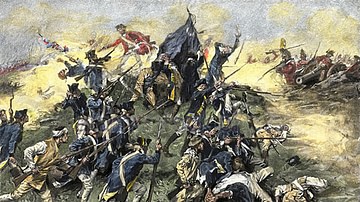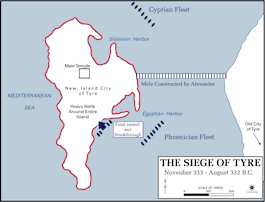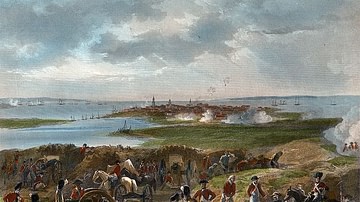Search
Search Results

Definition
Siege of Tobruk
The siege of the port of Tobruk in Libya (April to Dec 1941) by Axis forces during the Second World War (1939-45) lasted 242 days and became a symbol of Allied resistance. Besieged by land but still supplied by sea, Tobruk was of vital strategic...

Article
Siege of Savannah
The Siege of Savannah (16 September to 20 October 1779) was a significant engagement in the American Revolutionary War (1775-1783). Hoping to retake Savannah, Georgia, which had fallen to the British the previous year, a Franco-American force...

Article
Chariots in Ancient Indian Warfare
The chariot was the elite arm of ancient Indian armies in the Vedic (1500 BCE – 1000 BCE) and Epic periods (described by the Ramayana and the Mahabharata, 1000-600 BCE) because of the advantages it conferred and the selection of plain ground...

Article
Alexander's Siege of Tyre, 332 BCE
After defeating Darius III at the battle of Issus in November 333 BCE, Alexander marched his army (about 35,000-40,000 strong) into Phoenicia, where he received the capitulation of Byblus and Sidon. Tyrian envoys met with Alexander whilst...

Article
Elephants in Greek & Roman Warfare
In the search for ever more impressive and lethal weapons to shock the enemy and bring total victory the armies of ancient Greece, Carthage, and even sometimes Rome turned to the elephant. Huge, exotic, and frightening the life out of an...

Article
Siege of Charleston
The Siege of Charleston (29 March to 12 May 1780) was a major military operation during the American Revolutionary War (1775-1783). Hoping to establish a foothold in the American South, British commander-in-chief Sir Henry Clinton led an...

Article
Siege of Petersburg - Trench Warfare in the US Civil War
The Siege of Petersburg (June 1864 to April 1865), or the Richmond-Petersburg Campaign, was among the last military operations of the American Civil War (1861-1865). It was not a siege in the traditional sense, but rather a period of static...

Definition
Siege of the Alamo - The "small affair" That Won Texas Independence
The Siege of the Alamo (23 February to 6 March 1836) was an engagement of Texian forces with the Mexican Army, leading up to the Battle of the Alamo on the morning of 6 March 1836. The 13-day siege and battle has become legendary and is among...

Article
Fortifications in Ancient Chinese Warfare
While ancient Chinese warfare was often characterised by large armies in pitched battles, siege warfare and the sacking of cities were also regular features. Huge earth walls with towers and encircling ditches or moats became the normal strategy...

Definition
Ancient Persian Warfare
The ancient Persian military evolved from the earlier armed forces of the Medes which, in turn, developed from the warrior class of the indigenous people of the Iranian Plateau, the Aryan migrants (including the Persians) who later settled...